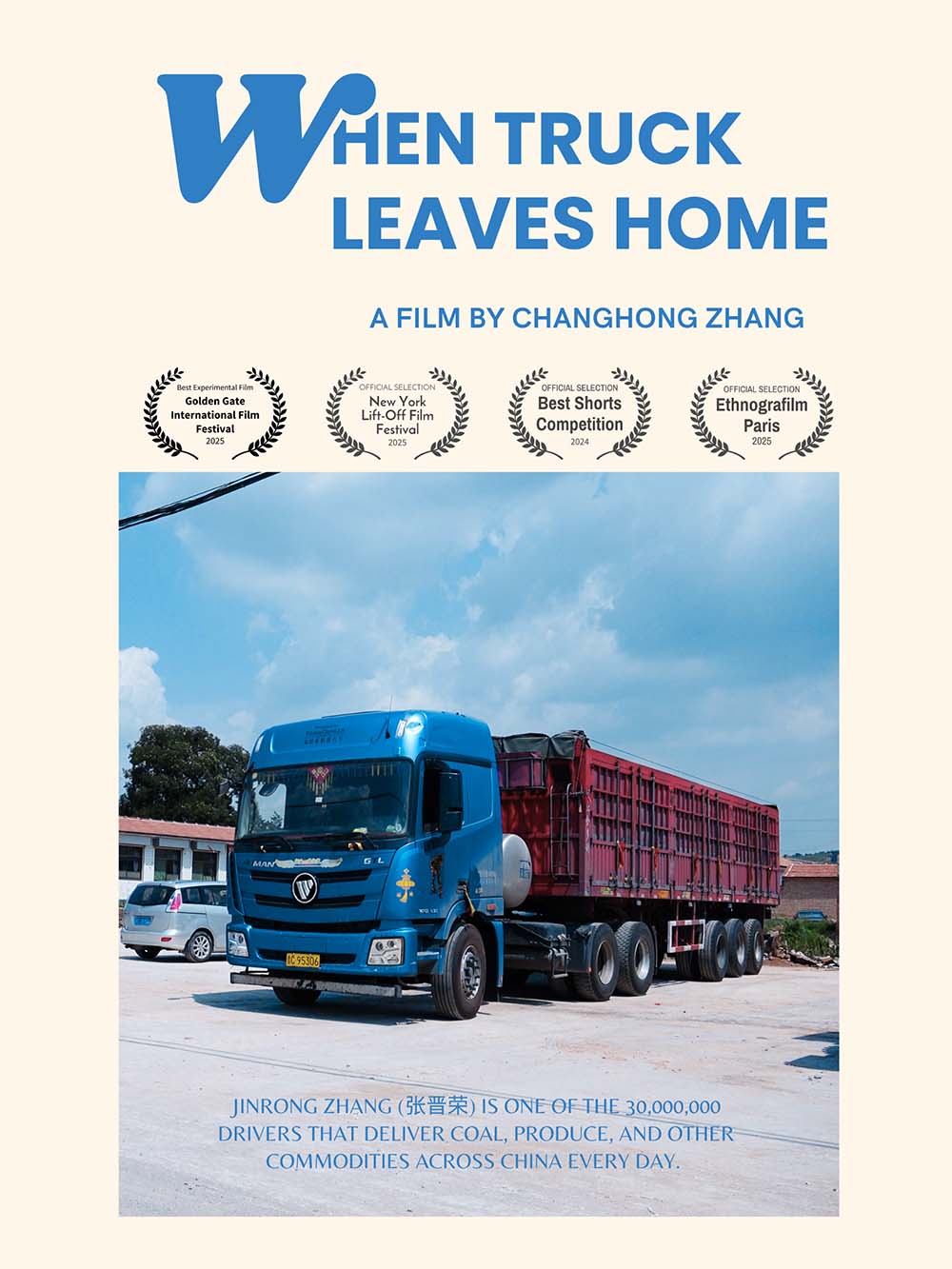Anthropology PhD Student Hong Zhang Directs Award-Winning Film

November 25, 2025
Abigail Arnold
Although fifth-year Anthropology PhD student Hong Zhang wasn’t a filmmaker before she came to Brandeis, she was already interested in visual storytelling. “I worked in journalism for a few years and was always interested in how the camera captured people’s emotions more than words did,” she said. “That got me interested in how to present themes I wanted to explore academically through film.” Zhang found the seeds for a film about long-haul truckers in China in her first year at Brandeis in a course with Patricia Alvarez Astacio, now a mentor in her filmmaking journey. The fourteen-minute film, “When Truck Leaves Home,” took her until her fourth year to finish, but then it took off: it received the Best Experimental Film Award at the Golden Gate International Film Festival this year and was an official selection for the Best Shorts Competition in 2024 and the New York Lift-Off Film Festival and Ethnografilm Paris in 2025.
“When Truck Leaves Home” tells the story of trucking labor in China, focusing on trucker Jinrong Zhang (Hong’s distant cousin), who represents millions of truckers in rural China. These long-haul truckers, usually men, spend most if not all of their time on the road, bringing home money to buy apartments for their families, probably in an urban area so their children can go to school there. “When I first asked these truckers what they thought of their jobs, they said there was nothing to say and it would be a waste of my time to meet them because it wasn’t interesting,” said Hong. “They have to go to training school and take multiple time-consuming tests to get licensed, but they don’t see their jobs as skilled labor and value education and schooling instead. I wanted to see what value means to them and their families, and that’s how the project got started.”
The film also got started through a course in Visuality and Visual Culture that Zhang took with Alvarez Astacio in her first semester at Brandeis. Prompted to create a visual essay that focused on materiality, Zhang started thinking about the truck as the most valuable item in these long-haul truckers’ lives. “It was during Covid and I couldn’t visit, so I asked my cousin Jinrong to take some pictures of his truck so I could see what it was like: how big, how wide, how much it could carry. Through that and a series of interviews, I learned about how these drivers get a loan to get a truck and pay it back monthly while making money; the size of the loans drives them to work nonstop, as they see a day off as wasted. The idea for the film was born out of the images he sent me. The materiality of the stuff in his truck – his water fountain, the bunk bed he sleeps in, his seat, the steering wheel, the tires – really got me thinking about how I could bring this out in a more interactive manner for an audience.”
Hong and Jinrong worked closely together to film “When Truck Leaves Home.” “In the beginning, he was not really comfortable showing himself in front of a camera, which was tied to how he did not see his labor as valuable,” said Hong. “We co-decided on the technique of making the film by attaching a Go-Pro to the dashboard of the truck, and he could decide when to turn it on and off.” Long-haul truckers in China typically drive for more than thirty-five hours without stopping, unless they get stuck in traffic; they bring a simple water fountain and meals from home to eat during these times. With all this driving, Hong and Jinrong produced about two hundred hours of footage, which ultimately got edited down into a fourteen-minute film. While Hong was not present for most of the time Jinrong was driving, “after a time, he decided it was okay to show his face and let me film him – he opened the door and jumped into the truck to show how high it was,” said Hong. The viewer catches brief glimpses of Jinrong while watching, “but for the most part, you do not see him in the film,” said Hong, “which is an artistic decision as well, showing how he represents millions of other truckers unseen by society and even their families.”
Zhang also worked alongside Alvarez Astacio in the process of editing and refining the film. “Patricia prompted me to start filming and always gave me prompts to think about why images and visuals matter and how they help me explore the questions I want to in a way that written text would not,” said Zhang. “She also helped me think about what to show and what not to show. After a couple rounds of rough edits, we’d sit together to watch, and she’d give me feedback, usually in the form of questions – instead of instructing me how to do it, she’d ask questions to get me to dig more into themes.” Alvarez Astacio also organized filmmaking workshops with graduate students, including a work-in-progress workshop with Gabriel Dattatreyan, an anthropologist and filmmaker at NYU.
Alongside making the film, Zhang has been working on her dissertation, which also incorporates film and is loosely connected to the subject of “When Truck Leaves Home” – her dissertation focuses on miners of mineral resources, which Jinrong later transports in his truck. Asked about her film’s honors, she said, “I haven’t had a lot of time to think about the awards since they all came during my fieldwork, so my mind is completely occupied by my dissertation. It was a nice surprise!” She hopes to continue working in ethnographic film and that “When Truck Leaves Home” will be just the beginning of a career.
You can watch “When Truck Leaves Home” in Brandeis Scholarworks.
Images courtesy of Hong Zhang.






